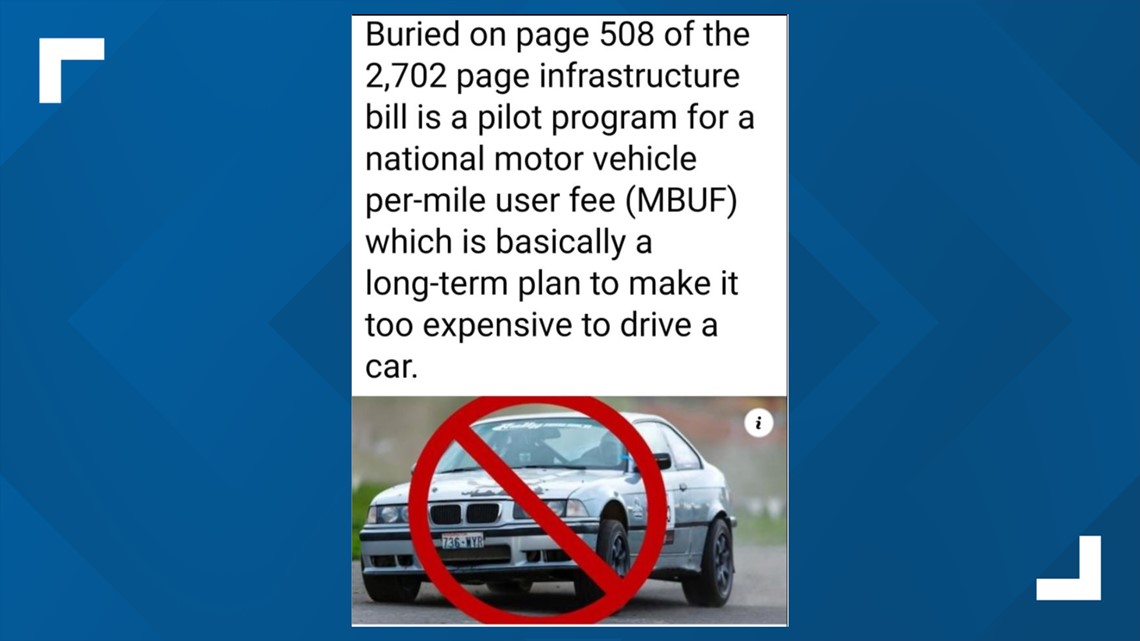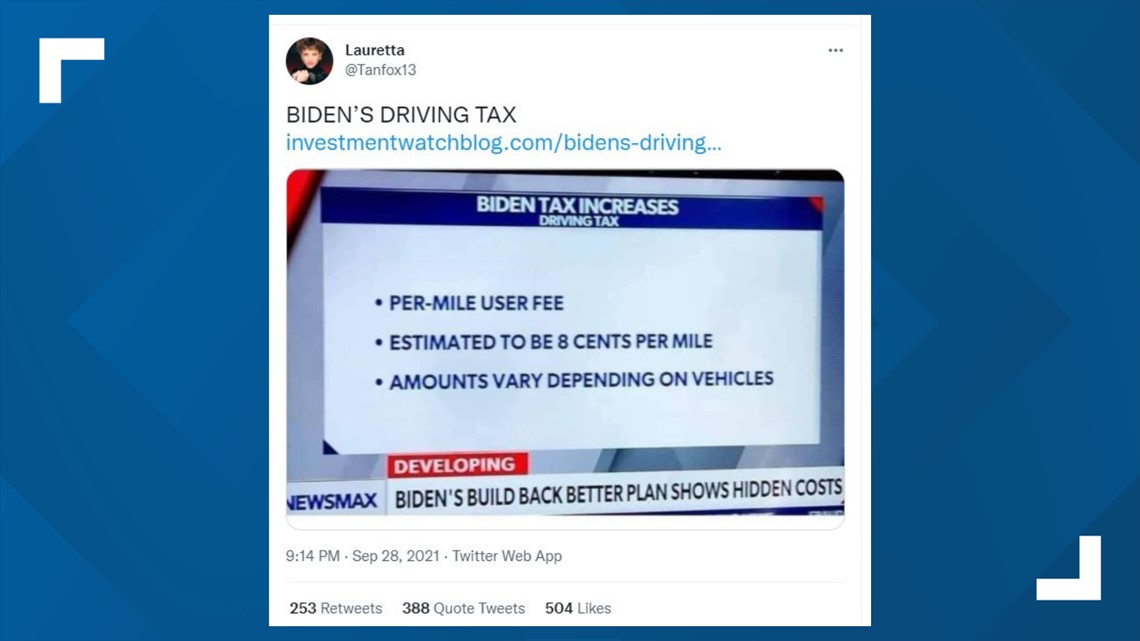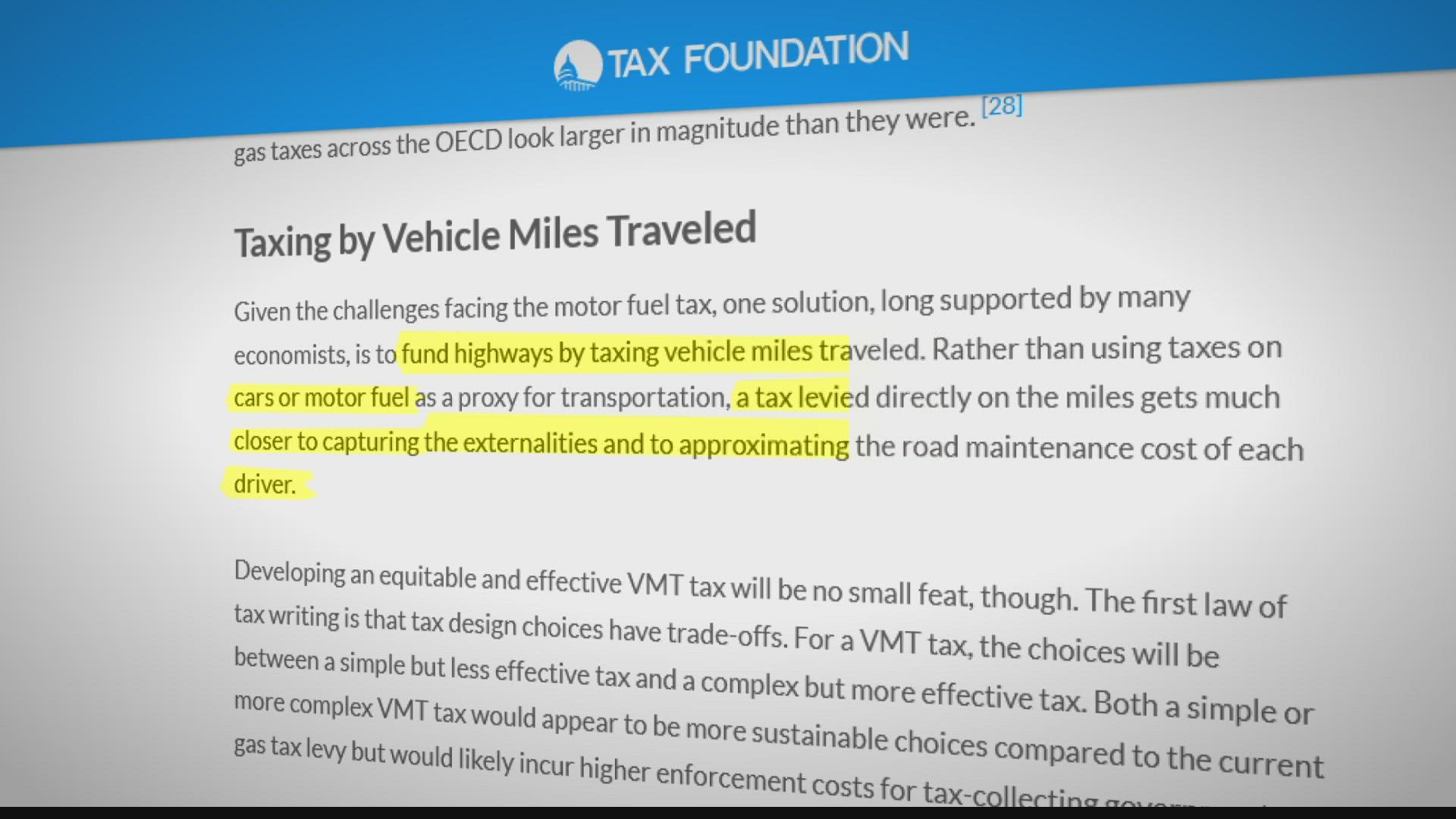INDIANAPOLIS — A trillion-dollar infrastructure bill is getting a lot of attention this week – not only on Capitol Hill, but also on social media. As lawmakers debate the fate of the bipartisan infrastructure plan, claims about the legislation are circulating on Facebook and Twitter.
“Buried on page 508 of the 2,702 page infrastructure bill is a pilot program for a national motor vehicle per-mile user fee (MBUF) which is basically a long-term plan to make it too expensive to drive a car,” says one Facebook post.


Another widely-circulated post on Twitter shows an image from NewsMax TV that refers to a per-mile user fee as a President Biden “driving tax.”


The claims have prompted confusion, with 13News viewers contacting VERIFY with multiple questions.
“I saw on Facebook that the government wants to start charging a mileage fee for every mile that people drive. Is this true?” wrote one viewer. Another asked, “Is it true President Biden’s infrastructure plan…has a per mileage usage tax associated with it?”
THE QUESTION
Does the current infrastructure bill include a new pilot program to study a per-mile user fee that would charge drivers based upon how many miles they drive?
THE SOURCES
- Text of House Resolution 3684, the Infrastructure Investment and Jobs Act
- Louisiana Senator Bill Cassidy
- The Tax Foundation, a non-profit independent tax policy research center
THE ANSWER
Yes, the infrastructure bill now working its way through Congress does include a pilot program to determine if a per mileage user fee based upon how much you drive would be feasible. But if the bill passes, it does not mean the government is starting to charge a per mile fee for every mile you drive. The bill would simply create a nationwide trial to figure out whether this type of user fee might make sense and if it’s even possible, and it would include only volunteers who wish to participate.
WHAT WE FOUND
To evaluate the claims and answer viewer questions, 13News VERIFY examined the actual infrastructure bill, H.R. 3684. The legislation is more than 2,700 pages long. On page 508, the legislation begins to outline a "National Motor Vehicle Per-Mile User Fee Pilot."
The program would create a pilot to see if the government can implement a fair and efficient way to raise highway funding through a fee that drivers would pay based on the amount they drive.
The bill mandates the Secretary of Transportation, Secretary of the Treasury and an advisory board establish a pilot program to achieve the following objectives:
- “To test the design, acceptance, implementation, and financial sustainability of a national motor vehicle per-mile user fee”
- “To address the need for additional revenue for surface transportation infrastructure and a national motor vehicle user fee”
- “Provide recommendations relating to the adoption and implementation of a national motor vehicle per-mile user fee.”
The program would essentially create a limited trial to see if the government can implement a fair and efficient way to raise highway funding through a fee that drivers would pay based on the amount they drive.
Right now, states and the federal government pay for road construction and maintenance primarily through fuel taxes and automobile registration fees. But that has left the nation’s highways underfunded and, in some places, in poor condition.
The non-partisan Tax Foundation says to fix that “One solution is to fund highways by taxing vehicle miles traveled. Rather than using taxes on cars or motor fuel… a tax levied directly on miles gets closer to capturing the externalities and approximating the road maintenance cost of each vehicle.”
The infrastructure bill – along with the idea of a per-mile user fee – passed the US Senate with support from all Democrats and 19 Republicans. One of those Republicans is Sen. Bill Cassidy (R - Louisiana) who helped negotiate the bill. In August, he took to Twitter to dispel myths about the legislation.
“There is no mileage tax in this bill,” Cassidy wrote. “What you are hearing is about a study to figure out if such a fee would even be possible for issues like electric cars driving on our streets without paying the gas tax like the rest of us. It does not implement a new tax.”
The bill calls for the pilot to include residents from all 50 states, D.C. and Puerto Rico, including drivers of both commercial and personal vehicles. All participants would volunteer for the pilot. Participants would keep paying the traditional gas tax, but would also start paying a per-mile user fee established by the Department of the Treasury. The government would then refund the costs for program participants.
The bill lists possible technology that could be used to implement the pilot program:
- Third-party onboard diagnostic (OBD-II) devices
- Smartphone applications
- Telemetric data collected by automakers
- Motor vehicle data obtained by car insurance companies
- Data from the states that received a grant under the FAST Act
- Motor vehicle data obtained from fueling stations
If the bill is approved as is, up to $125 million would be spent on the five-year pilot program that would last through summer of 2026.
While the legislation does call for a nationwide pilot program to figure out whether a per-mile user fee makes sense and is even possible, it will not create a new tax on drivers. The pilot will be evaluated by lawmakers and the U.S. Department of Transportation, which will then recommend whether to expand the pilot, create a national per-mile user fee system, abandon the concept or consider other options.

